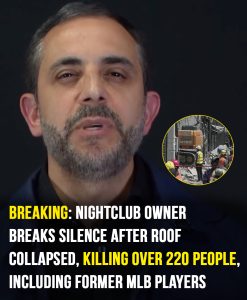The owner of a well-known nightclub in the Dominican Republic that collapsed and killed 221 people during a packed performance is finally speaking out, describing the tragedy as “devastating” and pledging to “stand by” the families of those who lost their lives while honoring their pain with compassion and accountability.

Antonio Espaillat, a renowned restaurateur and broadcasting executive, founded the Jet Set nightclub in 1973. Over the decades, the venue became an iconic hotspot in Santo Domingo, the capital city of the Dominican Republic. Known for attracting top-tier Latin musical talent, Jet Set was the beating heart of the local nightlife scene. From legendary merengue artists to emerging bachata singers, the nightclub’s stage launched and sustained musical careers and brought joy to thousands.
Jet Set was once regarded as the most popular venue of its kind in the country. It underwent major renovations in 2010 and again in 2015 to keep the space modern and vibrant. Despite its continued upgrades, the club experienced a mishap in 2013 when lightning struck the building, causing a fire that damaged parts of the entertainment center. However, the incident was resolved quickly, and the club reopened, continuing its legacy as a cultural hub.
On April 8, the venue welcomed hundreds of fans for its famous “Jet Set Mondays,” featuring celebrated merengue singer Rubby Pérez. At 69 years old, Pérez, a Dominican Republic native, was still a powerful draw. Reports say fans traveled from as far as North Carolina to see him perform live. But what was supposed to be a night of music, joy, and celebration quickly turned tragic.
Around 1 a.m., according to footage captured by a concertgoer and later shared with the BBC, something unexpectedly fell from the ceiling. Within seconds, terrified screams filled the room, and chaos erupted as people scrambled for safety. The video goes dark just as Pérez sings what would become his final notes.
In a matter of moments, the beloved nightclub was transformed from a place of life and rhythm into a disaster zone. The roof collapsed, trapping partygoers under the rubble. Emergency response teams arrived promptly and began working around the clock to search for survivors. Meanwhile, families and friends waited outside in anguish, clinging to the hope that their loved ones would be found alive.
Juan Manuel Méndez, director of the country’s Emergency Operations Center, became visibly emotional as he addressed the nation two days later. On April 10, Méndez tearfully announced that rescue operations had ended. “The country mourns. The Dominican family mourns,” he said.
Reflecting on the harrowing mission, Méndez admitted, “Today we concluded the most difficult task I have had in 20 years of leading this operations center.” Choking up, he continued, “I ask for forgiveness. Every time someone reported a missing loved one, we felt helpless knowing they were still under the debris and we couldn’t reach them.” He later told the New York Times that there were no more bodies left at the scene, confirming that every inch of the site had been searched.
According to official reports, 221 people were killed in what is now considered one of the most devastating incidents the Dominican Republic has faced in decades. Despite the staggering loss of life, 189 individuals were rescued, thanks to the tireless efforts of emergency crews.
Among the victims were not only Pérez, whose voice defined an era, but also former Major League Baseball players Octavio Dotel and Tony Blanco. Blanco is reported to have died while saving his close friend, fellow former MLB player Esteban Germán. Other notable victims include a retired United Nations official, prominent New York fashion designer Martín Polanco, an army captain and father of four young girls, as well as three employees of Grupo Popular – including the president of AFP Popular Bank and his wife.
In the wake of this catastrophe, Antonio Espaillat, owner of the nightclub and president of RCC Media—the Dominican Republic’s second-largest broadcaster—released a heartfelt message on Instagram, offering his condolences and support. Translated from Spanish, his message read: “There are no words to express the pain this tragedy has caused. It has been devastating for everyone. We want you to know we are with you and we share your anguish.”
Espaillat emphasized that since the beginning of the crisis, his team has been working in full collaboration with the authorities. “We have maintained constant communication with the Emergency Operations Center (COE) as the rescue efforts continue, alongside emergency crews, volunteers, and personnel from over 22 institutions,” he said.
Directly addressing the families affected, Espaillat added, “To the mothers, fathers, siblings, children, and loved ones of those who were impacted: you can count on us. We will stand by you.” He stressed that every action taken from this point forward would be made with one goal in mind—honoring the pain of the victims’ families. “Everything we do now, every decision, every step, is to live up to your pain and support you.”
Espaillat concluded his message with words of unity and compassion: “Today, more than ever, we are a family. Thank you.”
As the nation processes this heartbreaking loss, readers are encouraged to leave messages of love and support for the victims’ families in the comments below. Please take a moment to share this story, so we can collectively offer strength and healing to those enduring the pain of this unimaginable tragedy.





